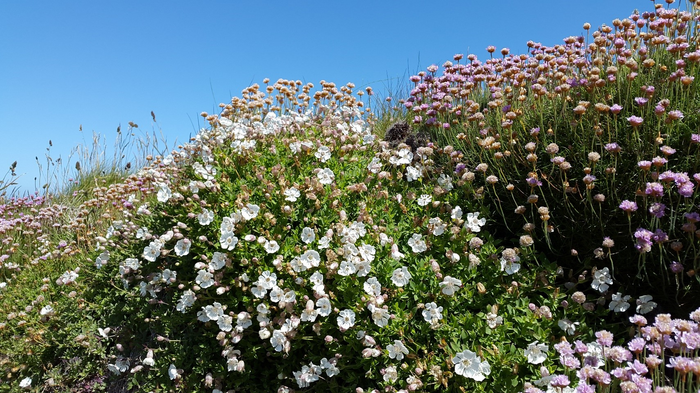The speed of environmental change is very challenging for wild organisms. When exposed to a new environment individual plants and animals can potentially adjust their biology to better cope with new pressures they are exposed to – this is known as phenotypic plasticity.

Credit: Bangor University
The speed of environmental change is very challenging for wild organisms. When exposed to a new environment individual plants and animals can potentially adjust their biology to better cope with new pressures they are exposed to – this is known as phenotypic plasticity.
Plasticity is likely to be important in the early stages of colonising new places or when exposed to toxic substances in the environment. New research published in Nature Ecology & Evolution, shows that early plasticity can influence the ability to subsequently evolve genetic adaptations to conquer new habitats.
Sea campion, a coastal wildflower from the UK and Ireland has adapted to toxic, zinc rich industrial-era mining waste which kills most other plant species. The zinc-tolerant plants have evolved from zinc-sensitive, coastal populations separately in different places, several times.
To understand the role of plasticity in rapid adaptation, a team of researchers lead by Bangor University conducted experiments on sea campion.
As zinc-tolerance has evolved several times, this gave the researchers the opportunity to investigate whether ancestral plasticity made it more likely that the same genes would be used by different populations that were exposed to the same environment.
By exposing the tolerant and sensitive plants to both benign and zinc contaminated environments and measuring changes in the expression of genes in the plant’s roots, the researchers were able to see how plasticity in the coastal ancestors has paved the way for adaptation to take place very quickly.
Dr Alex Papadopulos, senior lecturer at Bangor University explained:
“Sea campion usually grow on cliffs and shingle beaches, but mining opened up a new niche for them that other plants weren’t able to exploit. Our research has shown that some of the beneficial plasticity in the coastal plants has helped the mine plants to adapt so quickly.”
Alex added,
“Remarkably, if a gene responds to the new environment in a beneficial way in the ancestral plants, it is much more likely that that gene will be reused in all of the lineages that are independently adapting to the new environment. Phenotypic plasticity may make it more likely that there would be the same evolutionary outcome if the tape of life were replayed. If we understand the plastic responses that species have to environmental change, we may be better equipped to predict the impacts of climate change on biodiversity.”
Journal
Nature Ecology & Evolution
DOI
10.1038/s41559-022-01975-w
Method of Research
Experimental study
Subject of Research
Cells
Article Title
Genetic assimilation of ancestral plasticity during parallel adaptation to zinc contamination in Silene uniflora
Article Publication Date
26-Jan-2023
COI Statement
The authors declare no competing interests




